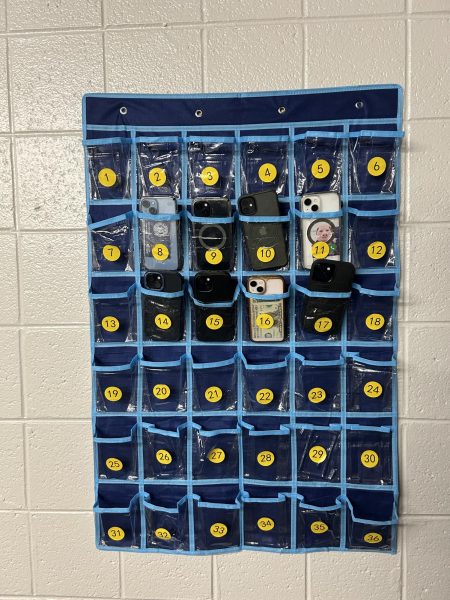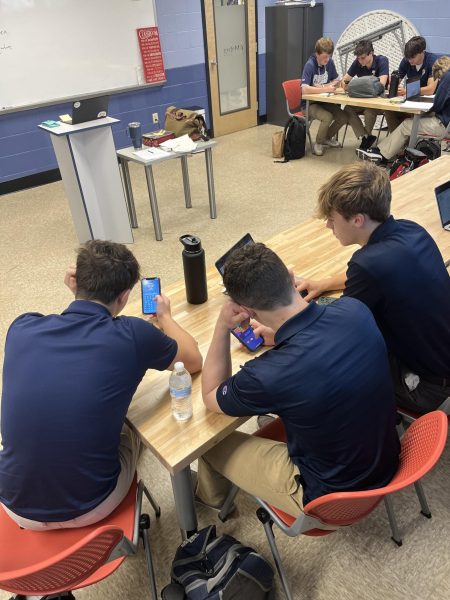Opinion: The pandemic may have influenced decreased student work ethic at Malvern
Whether it be reliance on online calculators, lenient scheduling, procrastination, or plain cheating, Malvern students may be developing a bad understanding of what it takes to succeed.

Cheating at Malvern has noticeably increased over the past year. Dean of Students Mr. Timothy Dougherty notes a large number of formal violations, which result from a serious offense.
“As of [Tuesday, May 18] there are 29 academic honesty violations so far this year. Then there are other sorts of discussions that happened that didn’t get an infraction,” Dougherty said.
Although cheating will never be erased from an academic environment, factors that came with the pandemic have allowed it to run rampant at Malvern. I believe that students are not intrinsically drawn to cheating, but the ease of having it as a backup plan influences its increased use at Malvern. Students may go into a unit believing that they will study and master the material, but push off taking notes or studying for other homework, telling themselves that they can use other resources during the test for the worst-case scenario. Unfortunately, this cycle continues, further crippling the student.
According to Dougherty, most of the cheating was from accessing resources off-campus that was not allowed.
The new online environment allows students to feel more in control of their actions. They feel that because they are online, they can access anything they want to.
Cade Heppelmann ’24 believes that cheating can only hurt the student.
“If you’re cheating, you’re not learning material. That’s going to overall hurt students in the long run,” Heppelmann said.
I tend to look at cheating like any other addictive action. At first, you allow it just for that one time. When that one time results in something good – a good grade on a test – you rationalize with its morality and effectiveness. The action will become easier and easier to do as you convince yourself of its usefulness. This, much like anything addictive, will create an unavoidable reliance on cheating.
The dependence on cheating destroys a student’s work ethic, constantly reminding themselves that they can always cheat to find the result. The flawed habits and work ethic will not translate into jobs and everyday life, where problems cannot be solved with a simple google search.
Theology teacher Mrs. Jessica Kenworthey believes the process is the most important part of learning, and cheating entirely takes away from it.
“If you’re trying to learn a process in math and you’re using Photmath, you’re not doing the process. I would not want to take my car to a mechanic who hadn’t been through the process of fixing the carburetor 100 times before,” Kenworthey said.
Motivation may be another factor in the possible diminishment of student work ethic. Many teachers have noticed a decrease in drive among students during classes. Dougherty believed that it may have something to do with the lenient schedule that students have. Some students don’t have their first class until 11:40, so they enter Malvern with the wrong mental preparation.
I believe that the lack of events and celebrations to look forward to may also have hindered motivation. Malverns celebrations and events were widely popular among the student body, but due to COVID-19 precautions, many of them could not occur on campus this year. Without many tangible things to look forward to, many students could have felt less motivated to excel in their studies.
Heppelmann noticed that online learning specifically hindered his ability to focus.
“I can tell my concentration has lowered a lot and my focus is lacking more in online classes,” he said. “There were a lot more distractions at home, like your phone.”
The temptation of accessing these stimulating devices and activities is too much to handle for many students, finding themselves glued to their phones during an online class. I empathize with people who experience this because it is extremely difficult to resist distractions. Our brains understand the rush of dopamine that comes from these devices, and it is unfair to expect students to choose difficult classes over TikTok.
Member of the ninth-grade academy and English teacher Mrs. Susan Giordani believes that correctly using the tools online can create more student interaction, which hopefully has a direct correlation to motivation.
“You have that chat box so you can have a conversation with someone while something else is happening. You can also use the little polls or whatever to gauge the pulse,” Giordani said.
According to Dougherty, there are discussions of eliminating the virtual component for the next school year.
Taking advantage of the tools provided online is important, but we should also be wary of becoming reliant on online learning. While it has benefits, such as the increased amount of resources and access for sick students, Malvern should not make it their main way of educating.










